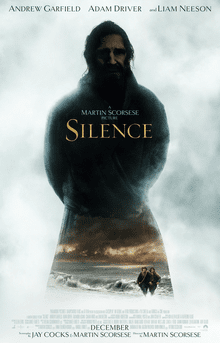
It all goes wrong for two idealistic young Portuguese priests in Martin Scorsese’s brilliant work, SILENCE. For silence is what they get from God, despite all their earnest prayers and pleadings for answers and hope.
The two, Father Rodrigues (Andrew Garfield) and Father Francisco Garrpe (Adam Driver) have heard that their mentor, Father Ferreira (Liam Neeson), may have become apostate after witnessing unrelenting torture of other priests and Christian converts from Buddhism in 17th century Japan.
In the early scenes, these two stand out as sure of themselves, sure of their calling and equally sure of the pleasure of God in their passionate pursuit to save Father Ferreira’s soul. Ultimately, they convince their superior that they must, indeed must, go to Japan and do their redemptive work.
They fail.
SILENCE won’t be popular
The Evangelicals aren’t going to like this film. No nicely scrubbed faces sitting around a charismatic leader, happy studying their Bibles and eagerly sharing the latest miracles and “how God spoke to them” in the last week.
The health, wealth, and prosperity gospel people aren’t going to like it because every single character was destitute and dirty and most displayed rotten teeth. Obviously, their faith was not doing them a bit of good regarding material wealth, personal health, and an increase of high-end possessions.
The Roman Catholics aren’t going to like it because the leading characters, two priests, do end up renouncing their faith.
My husband didn’t like it. He said, “You didn’t tell me before you married me that you would drag me to films that would psychologically traumatize me.”
However, a day later, he said, “That is a film I can now say I’m glad I saw.”
And the packed audience at the pre-release screening of SILENCE sat in utter silence as the two hour, forty minute film told its story. We watched the excruciating process detailing the end of the surface faith of Father Rodrigues. We also saw its replacement with something far more real, even as he left established faith practices behind.
The seeker of God who has found the easy answers of “Jesus loves you” and “everything happens for a reason” to have lost any meaning will like the film. We can accompany Father Rodrigues and appreciate the apostate journey of Father Ferriero because Scorsese takes us all the way to the bottom of the soul, all the way to the pit of desperation, all the way to the place where God cannot be and there find God.
I assume we all breathed during the screening, but I don’t remember taking a breath.
I do know that the moment the Father Rodrigues renounced his faith to stop the torture of fellow Christians, the message of Christ fully penetrated the film.
The film exposes our hubris
Human hubris says that God can’t manage without us.
Human hubris says, “I will never renounce my faith, no matter how much I suffer or how much others suffer because I stay true
Human hubris says, “God will answer my prayers and fix all this.
Human hubris says, “It will all be OK in the end. If it is not OK, it must not be the end.”
Human hubris says, “I can follow Jesus all the way to the cross and into his death and be just as forgiving as he was.”
But Father Rodrigues finally realizes that he is not Jesus. He finally realizes that his absolute surety in his goodness and faith is bringing unimaginable pain and torture to innocent people.
Now, as far as I can see, this film is getting less than positive words from professional reviewers. Too long, too slow, etc. although there is general agreement about the extraordinary cinematology and the well-played characters.
But the spiritual journey is long, slow, often boring, and full of painful stuff. In SILENCE, we see just how difficult it is to offer forgiveness to the repeat offender. That alone makes the movie worth seeing.
Forgiveness, the ultimate Christ-act that each of us is required to give to others, costs everything. That cost is brilliantly portrayed here.
Lots of people should see this film:
- Those who think torture is OK and justifiable to extract the “truth”.
- Those who believe they have a direct line to God and that if they follow “God’s perfect will” they will be OK.
- Those who think that the Christian Gospel (as they understand it) demands that the rest of the world adjust to suit that particular theological mindset.
- Those who are fed up with easy answers to human challenges.
- Those who question the oppressive tendencies of Western Christianity.
There is nothing trite about this story of going to the depths of one’s faith. There is not one single easy answer to any of the many dilemmas in front of the characters. There are no happy endings; no “everything works together for good” neat wrap-ups. There is raw pain, deep longing for God, silence, hunger, deprivation, dirt, oppression, fear, torture.
SILENCE is not a “feel good” movie.
But it is a profoundly Christ-aware piece of film excellence.













